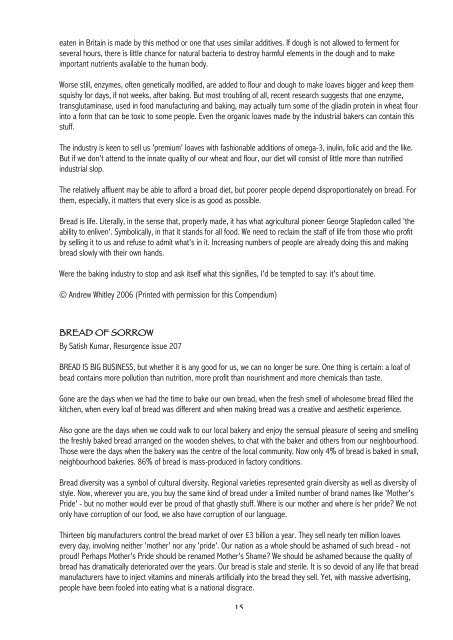THE COMPANION FESTIVAL OF BREAD - Eva Bakkeslett
THE COMPANION FESTIVAL OF BREAD - Eva Bakkeslett
THE COMPANION FESTIVAL OF BREAD - Eva Bakkeslett
Create successful ePaper yourself
Turn your PDF publications into a flip-book with our unique Google optimized e-Paper software.
eaten in Britain is made by this method or one that uses similar additives. If dough is not allowed to ferment for<br />
several hours, there is little chance for natural bacteria to destroy harmful elements in the dough and to make<br />
important nutrients available to the human body.<br />
Worse still, enzymes, often genetically modified, are added to flour and dough to make loaves bigger and keep them<br />
squishy for days, if not weeks, after baking. But most troubling of all, recent research suggests that one enzyme,<br />
transglutaminase, used in food manufacturing and baking, may actually turn some of the gliadin protein in wheat flour<br />
into a form that can be toxic to some people. Even the organic loaves made by the industrial bakers can contain this<br />
stuff.<br />
The industry is keen to sell us 'premium' loaves with fashionable additions of omega-3, inulin, folic acid and the like.<br />
But if we don't attend to the innate quality of our wheat and flour, our diet will consist of little more than nutrified<br />
industrial slop.<br />
The relatively affluent may be able to afford a broad diet, but poorer people depend disproportionately on bread. For<br />
them, especially, it matters that every slice is as good as possible.<br />
Bread is life. Literally, in the sense that, properly made, it has what agricultural pioneer George Stapledon called 'the<br />
ability to enliven'. Symbolically, in that it stands for all food. We need to reclaim the staff of life from those who profit<br />
by selling it to us and refuse to admit what's in it. Increasing numbers of people are already doing this and making<br />
bread slowly with their own hands.<br />
Were the baking industry to stop and ask itself what this signifies, I'd be tempted to say: it's about time.<br />
© Andrew Whitley 2006 (Printed with permission for this Compendium)<br />
<strong>BREAD</strong> <strong>OF</strong> SORROW<br />
By Satish Kumar, Resurgence issue 207<br />
<strong>BREAD</strong> IS BIG BUSINESS, but whether it is any good for us, we can no longer be sure. One thing is certain: a loaf of<br />
bead contains more pollution than nutrition, more profit than nourishment and more chemicals than taste.<br />
Gone are the days when we had the time to bake our own bread, when the fresh smell of wholesome bread filled the<br />
kitchen, when every loaf of bread was different and when making bread was a creative and aesthetic experience.<br />
Also gone are the days when we could walk to our local bakery and enjoy the sensual pleasure of seeing and smelling<br />
the freshly baked bread arranged on the wooden shelves, to chat with the baker and others from our neighbourhood.<br />
Those were the days when the bakery was the centre of the local community. Now only 4% of bread is baked in small,<br />
neighbourhood bakeries. 86% of bread is mass-produced in factory conditions.<br />
Bread diversity was a symbol of cultural diversity. Regional varieties represented grain diversity as well as diversity of<br />
style. Now, wherever you are, you buy the same kind of bread under a limited number of brand names like 'Mother's<br />
Pride' - but no mother would ever be proud of that ghastly stuff. Where is our mother and where is her pride? We not<br />
only have corruption of our food, we also have corruption of our language.<br />
Thirteen big manufacturers control the bread market of over £3 billion a year. They sell nearly ten million loaves<br />
every day, involving neither 'mother' nor any 'pride'. Our nation as a whole should be ashamed of such bread - not<br />
proud! Perhaps Mother's Pride should be renamed Mother's Shame? We should be ashamed because the quality of<br />
bread has dramatically deteriorated over the years. Our bread is stale and sterile. It is so devoid of any life that bread<br />
manufacturers have to inject vitamins and minerals artificially into the bread they sell. Yet, with massive advertising,<br />
people have been fooled into eating what is a national disgrace.<br />
15




